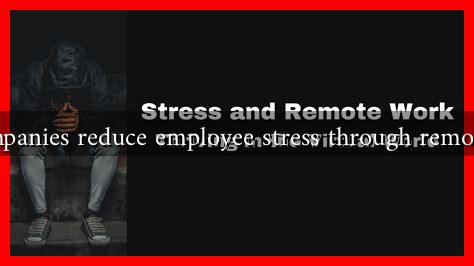-
Table of Contents
- Can Companies Reduce Employee Stress Through Remote Work?
- The Benefits of Remote Work on Employee Stress
- Challenges of Remote Work and Employee Stress
- Case Studies: Companies Successfully Reducing Stress Through Remote Work
- Statistics Supporting Remote Work and Stress Reduction
- Conclusion: The Future of Remote Work and Employee Well-Being
Can Companies Reduce Employee Stress Through Remote Work?
In recent years, remote work has transitioned from a niche benefit to a mainstream practice, especially accelerated by the COVID-19 pandemic. As organizations adapt to this new normal, a pressing question arises: can remote work effectively reduce employee stress? This article explores the relationship between remote work and employee stress, examining its benefits, challenges, and real-world examples.
The Benefits of Remote Work on Employee Stress
Remote work offers several advantages that can contribute to reducing employee stress levels. Here are some key benefits:
- Flexibility: Remote work allows employees to create their own schedules, which can lead to a better work-life balance. This flexibility enables individuals to manage personal responsibilities, such as childcare or health appointments, without the added stress of commuting.
- Reduced Commute: Eliminating the daily commute can save employees time and reduce stress. According to a study by the U.S. Census Bureau, the average American spends about 26 minutes commuting one way. Remote work can free up this time for relaxation or personal activities.
- Personalized Work Environment: Employees can tailor their workspaces to suit their preferences, whether that means a quiet home office or a cozy corner of their living room. A comfortable environment can enhance productivity and reduce stress.
- Increased Autonomy: Remote work often comes with greater autonomy, allowing employees to take ownership of their tasks. This empowerment can lead to increased job satisfaction and lower stress levels.
Challenges of Remote Work and Employee Stress
While remote work has its advantages, it also presents challenges that can contribute to employee stress. Understanding these challenges is crucial for companies aiming to create a supportive remote work environment.
- Isolation: Remote employees may experience feelings of loneliness and isolation, which can negatively impact mental health. A survey by Buffer found that 20% of remote workers struggle with loneliness.
- Blurred Boundaries: The lack of physical separation between work and home can lead to overworking. Employees may find it difficult to “switch off,” resulting in burnout.
- Communication Barriers: Remote work can hinder spontaneous communication and collaboration, leading to misunderstandings and increased stress. A study by Harvard Business Review highlighted that remote teams often face challenges in maintaining effective communication.
Case Studies: Companies Successfully Reducing Stress Through Remote Work
Several companies have successfully implemented remote work policies that prioritize employee well-being. Here are a few notable examples:
- GitLab: This all-remote company emphasizes transparency and communication. They provide employees with mental health resources and encourage regular check-ins, which have contributed to a positive work culture and reduced stress levels.
- Zapier: Zapier has a strong focus on work-life balance, offering flexible schedules and unlimited vacation days. Their commitment to employee well-being has resulted in high job satisfaction and low turnover rates.
- Buffer: Buffer has implemented a four-day workweek for its remote employees, allowing for extended rest and recovery time. This initiative has led to increased productivity and reduced stress among team members.
Statistics Supporting Remote Work and Stress Reduction
Research supports the notion that remote work can lead to lower stress levels. According to a survey conducted by FlexJobs, 73% of respondents reported that flexible work arrangements significantly reduced their stress. Additionally, a study by Owl Labs found that remote workers are 22% happier than their in-office counterparts.
Conclusion: The Future of Remote Work and Employee Well-Being
In conclusion, while remote work presents both benefits and challenges, it has the potential to significantly reduce employee stress when implemented thoughtfully. Companies that prioritize flexibility, communication, and employee well-being can create a supportive remote work environment that fosters productivity and job satisfaction. As organizations continue to navigate the evolving landscape of work, embracing remote work as a viable option can lead to healthier, happier employees.
For more insights on remote work and employee well-being, consider exploring resources from FlexJobs and Owl Labs.

